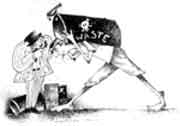Under siege
 in the second week of February 1998, political representatives of more than 100 countries will meet in Kucin, Malaysia, to deliberate upon the fate of the historic decision to ban the export of hazardous wastes from the Organisation for Environmental Cooperation and Development ( oecd) to the non- oecd countries. The ban, popularly referred to as the Basel Ban, is the most significant post-Rio environmental decision made by the international community.
in the second week of February 1998, political representatives of more than 100 countries will meet in Kucin, Malaysia, to deliberate upon the fate of the historic decision to ban the export of hazardous wastes from the Organisation for Environmental Cooperation and Development ( oecd) to the non- oecd countries. The ban, popularly referred to as the Basel Ban, is the most significant post-Rio environmental decision made by the international community.
Owing to the pressure from a section of the industry and waste exporting nations (including the usa) , India has not yet supported the ban openly. That is despite India's principle of opposing toxic waste exports from oecd and non- oecd countries. Now, the government is rumoured to be exploring options to bypass the Basel Ban by negotiating bilateral agreements with the waste exporting nations.
The European Union ( eu ), however, has clearly conveyed its member states that negotiating bilateral agreements to facilitate hazardous waste exports from the eu to non- oecd nations violates the letter and spirit of the Basel meet. The eu has already adopted a regulation that prohibits export of hazardous wastes. India is seen as a garbage dump by the industrialised nations of the West. The wastes have added to the pollution of our waters, land, and air, and poisoned our workers, children, and communities.
Since the pollution control norms are very stringent in the West, industries there find it very expensive to dispose their hazardous wastes within their own countries. Many of these companies find it easier to pack the wastes in containers and ship them to India, where the enforcement of pollution control norms are very weak.
The wastes, such as toxic zinc, ash, lead, and battery waste, are purchased by Indian companies for recovering commercially valuable metals. But the recoverable material is only a portion of the wastes. The remainder is highly toxic trash that the West sends to India for final dumping. After recovering a small proportion of commercially important material from the imported waste, the highly toxic residue is dumped into open drains, rivers, fields, or vacant plots. The contamination seeps into the soil and ground water and poses a very serious health risk to communities living nearby.
To prevent the industrialised countries from peddling the poisonous leftovers of their affluent lifestyles to the developing world, poorer nations from Africa, Latin America, and Asia joined hands in the subsequent years to call for a total ban on the exports of hazardous wastes from developed countries to developing nations. This ban was formally adopted into the convention text in 1995 by representatives of 82 governments present at the meeting.
The Supreme Court of India has also recently banned the imports of hazardous wastes into the country. However, until India ratifies or formally adopts the ban amendment, its people and environment will remain open to the threat of contamination by foreign waste.
By ratifying the ban, India will transfer a bulk of the onus of regulation onto exporting countries. In other words, exporters will be required to ensure that only uncontaminated, non-hazardous waste is allowed to be shipped to India.
Not only that, by ratifying the ban now, India will become the first developing nation to do so. This will send the signal that India values its environment and the lives of its citizens and is capable of making independent decisions in the interest of its people without giving in to the strong-arm tactics of wealthier nations like the us .
The Basel Ban will become a legal binding when there is a two-third majority, among of the 82 countries, agreeing to ratify it in their parliaments. The European Union has already passed legislation on the lines of the Basel Convention and has ratified the ban. However, quite predictably, major generators of hazardous wastes like the United States and Australia are keen to undermine the ban.
Efforts are on by the waste trade lobby to cut the list of hazardous wastes that are internationally banned for export. However, regardless of the definition, a hazardous waste remains a hazardous waste. And there is no safe way of recycling hazardous wastes. In India, the metals "recovery' industry gains its competitive edge by saving on pollution control. Even facilities that claim to be the best in the country are grossly polluting and present a significant threat to communities living nearby. Importers in India, however, can still import wastes that are uncontaminated or that are decontaminated by the exporter before shipping to India.
Nityanand Jayaraman is the Greenpeace representative in India.
Related Content
- The Indian Forest (Amendment) Bill. 2017
- Great Barrier Reef: 93% are Bleached
- GMO backlash threatens beet farmers as foodmakers swap sugars
- Odisha flood: Sambalpur, Jharsuguda under siege, trains hit
- A sanctuary by chance, now under siege
- John Kerry launches global effort to save world's oceans 'under siege'
